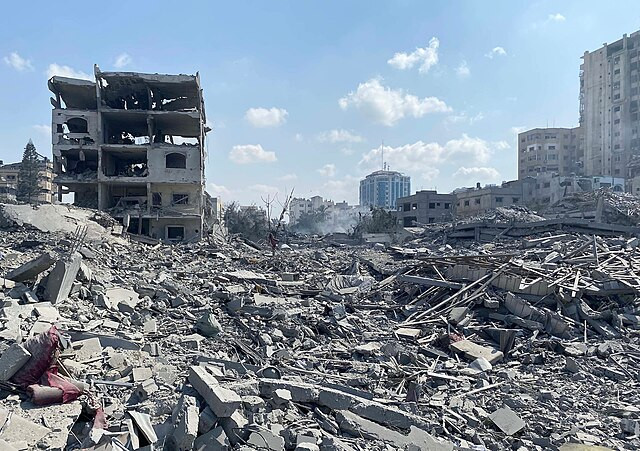Israeli airstrikes killed at least 36 Palestinians in southern Gaza on Saturday, just as international efforts to broker a ceasefire were intensifying. The strikes targeted multiple locations, including residential areas, leaving a trail of destruction and mourning in their wake. The assault comes as officials from Hamas and other key players gather in Cairo to discuss a potential ceasefire, mediated by the United States, Egypt, and Qatar.
Among the dead were 11 members of a single family, including two children, who were killed when an airstrike hit their home in Khan Younis, according to reports from Nasser Hospital. The hospital received 33 bodies from three separate strikes in and around the city. Al-Aqsa Martyrs Hospital, located nearby, also reported receiving three bodies from another strike. The Israeli military has stated that it is investigating these reports.
First responders recovered 16 bodies from the Hamad City area of Khan Younis following a partial withdrawal of Israeli forces. An additional 10 bodies were found in a residential block west of Khan Younis, and two more were recovered further south in Rafah. The exact circumstances of their deaths remain unclear, but the areas had been subjected to intense bombardment over the past week.
Residents who have returned to the devastated Hamad City described a scene of utter destruction. Neveen Kheder, a resident, voiced the despair of many, saying, "There is nothing, no apartment, no furniture, no homes, only destruction. We are dying slowly. You know what, if they gave a mercy bullet, it would be better than what is happening to us."
The conflict in Gaza, which began when Hamas and other militants launched a surprise attack on Israel on October 7, has escalated into one of the deadliest confrontations in recent years. The initial attack by Hamas resulted in the deaths of approximately 1,200 people, mostly civilians. Hamas is believed to be holding around 110 hostages, with Israeli authorities estimating that about a third of them are dead.
In response, Israel's retaliatory offensive has led to significant casualties in Gaza. According to Gaza's Health Ministry, more than 40,000 Palestinians have been killed since the conflict began. The ministry, which does not distinguish between civilians and combatants, reported that 69 people were killed, and 212 were wounded in the past 24 hours alone.
As the airstrikes continue, the U.S. is pushing for a ceasefire. High-level talks are set to take place in Cairo, with CIA Director William Burns and Brett McGurk, the White House's top Middle East adviser, leading the U.S. delegation. The talks will involve senior Egyptian and Qatari officials, although Hamas will not participate directly. Instead, the group will be briefed on the progress by Egyptian and Qatari mediators.
The Israeli delegation, which arrived in Cairo on Thursday, includes the heads of the Mossad foreign intelligence service and Shin Bet security service, along with Major General Eliezer Toledano. The U.S. is working to bridge the gaps between Israel and Hamas, particularly over Israel's demand to maintain control over two strategic corridors in Gaza. These corridors, the Philadelphi corridor along the border with Egypt and the Netzarim east-west corridor, are seen by Israel as crucial for preventing arms smuggling and capturing militants.
The situation remains tense, with the U.S. expressing concerns about the potential for a wider regional conflict. General CQ Brown Jr., Chairman of the U.S. Joint Chiefs of Staff, is visiting Egypt, Jordan, and Israel to emphasize the importance of preventing further escalation.
President Joe Biden has been actively involved in the diplomatic efforts, recently speaking with Israeli Prime Minister Benjamin Netanyahu to stress the urgency of reaching a deal. Biden also held discussions with the leaders of Qatar and Egypt as part of the broader effort to secure a ceasefire.
However, significant differences remain between Israel and Hamas, particularly regarding control of the strategic corridors in Gaza. Netanyahu has insisted that Israel must retain control to ensure security, while Hamas has demanded a full withdrawal of Israeli forces from the territory.




